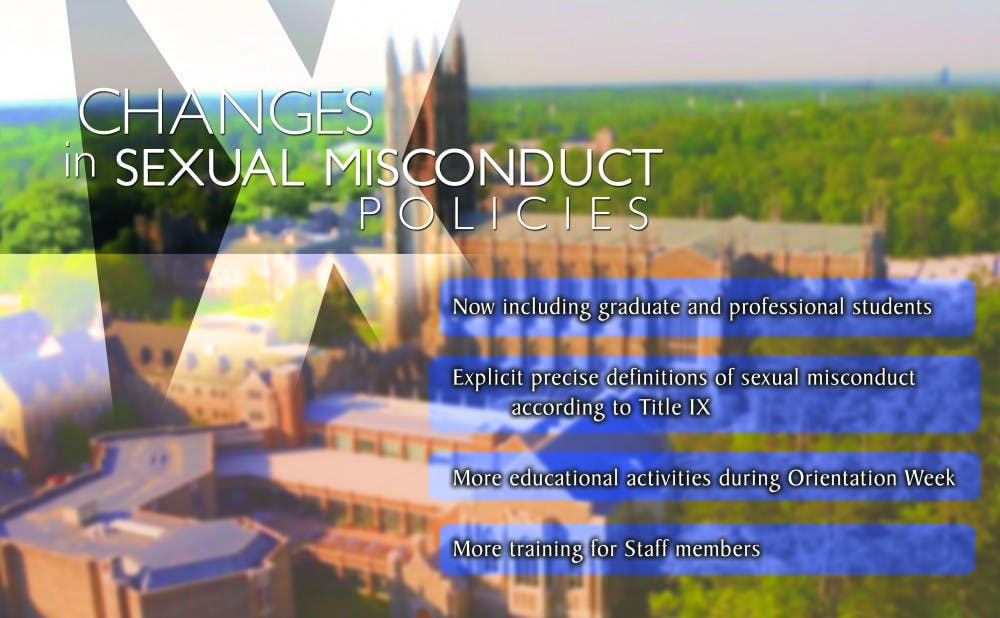As sexual assault on college campuses continues to capture the national spotlight, Duke has tightened its policies in an attempt to increase awareness.
This summer, Duke revised its policies and practices, summarizing the changes in a new website that went live before the start of this semester. The website—which outlines Duke’s commitment to addressing sexual misconduct—features strict definitions of both sexual misconduct and consent as well as details about investigation and hearing procedures. There has been a persistent rise in the number of reports brought to the attention of the Gender Violence Prevention and Intervention office since the changes were implemented, Vice President for Student Affairs Larry Moneta said.
"From the get go we have said the initial evidence of any success is not going to be a decrease in numbers, it’s going to be an increase,” Moneta said—emphasizing the importance of bringing awareness to the issue and ways for students to report it and seek help.
Details of Duke’s hearing procedures and the various processes were further clarified and tightened in their language, Moneta said, adding that the sexual misconduct policy now applies to all graduate and professional students, as well as undergraduates. The explicit definition of sexual misconduct was adjusted to be precisely in line with Title IX and its obligations, he said.
“Duke has been aggressively focusing on gender violence for many years, way longer than the national press is paying attention to it,” Moneta said. “The policy we currently have reflects a lot of work over the summer."
Duke has remained committed to work towards properly handling incidents of sexual assault, specifically amidst increased coverage of such incidents. A University of Virginia rape case portrayed in a recent Rolling Stone article, along with the case of Emma Sulkowicz—a senior at Columbia University who has been protesting the school’s handling of her sexual assault case by lugging her mattress around campus since September—have brought these cases of misconduct to national attention. In addition, 85 institutions, including the University of North Carolina at Chapel Hill, are currently under federal investigation for Title IX violations.
Moneta said continued directives from various federal entities enabled Duke to constantly update and adjust its policies and practices in order to be consistent with the latest information.
Duke's updated policy outlines in detail the protocol for reporting cases, the complaint resolution process and hearing procedures. Examples of sexual misconduct are also provided, including both heterosexual and same-sex encounters.
Madeleine Lambert, co-professor of a course titled Telling Stories for Social Change: Confronting Sexual and Domestic Violence at Duke and in Durham, noted that there needs to be a greater push towards the policy being more inclusive in terms or non-heterosexual or cisgender identities and sexual orientations.
“A lot of times we think about sexual violence, there is still very much a lens of looking at it between a male perpetrator and a female victim, even though we are in open and progressive environments,” Lambert said. “I think that there needs to be more visibility and more language that supports other types of relationships.”
Moneta added that the administration is hoping to create conditions in which students are confident and have the trust of the system to be able to bring cases forward, resulting in an increased number of reports. He added, however, that not nearly enough of the cases reported to the women's center end up being brought to campus or criminal judicial processes.
“Staffers have to be highly creating confidence in the processes so students will not just report cases for support, but will also feel confident to bring the cases forward to adjudication,” he said.
There will be continued educational efforts, Moneta noted, adding that the school will probably be required to institute a survey assessing students’ experiences on campus, their confidence in various systems and access to information.
“We’re going to have to really redouble our education efforts for everyone—students, faculty and staff,” Moneta said.
Moneta noted the potential for increased availability of mandatory training options as well as the probability of increasing staff both in the women’s center and office of student conduct.
“If we’re successful first in getting cases brought forward, we have to be able to deal with them expeditiously,” he said.
Lambert said she has noticeded a wish among students for greater transparency between the Women’s Center, the administrative body and the Center for Sexual and Gender Diversity. Some also request for the process of reporting and adjudication to be made clearer to both individuals involved in the case.
“Some of the students said they were really unclear of how the process works, so having more clarity [would be beneficial],” she said.
Though Duke is currently working to increase awareness and the number of reports filed, the ultimate goal is a decrease in sexual misconduct. But in order for significant change to happen, campus culture needs to shift, Moneta said.
“My hope is that we will influence enough of a culture change that through a bystander intervention like [Prevent.Act.Challenge.Teach training]…we can begin to see a decline of the numbers,” Moneta said. “But I don’t think thats going to happen in the near future.”
Get The Chronicle straight to your inbox
Sign up for our weekly newsletter. Cancel at any time.

